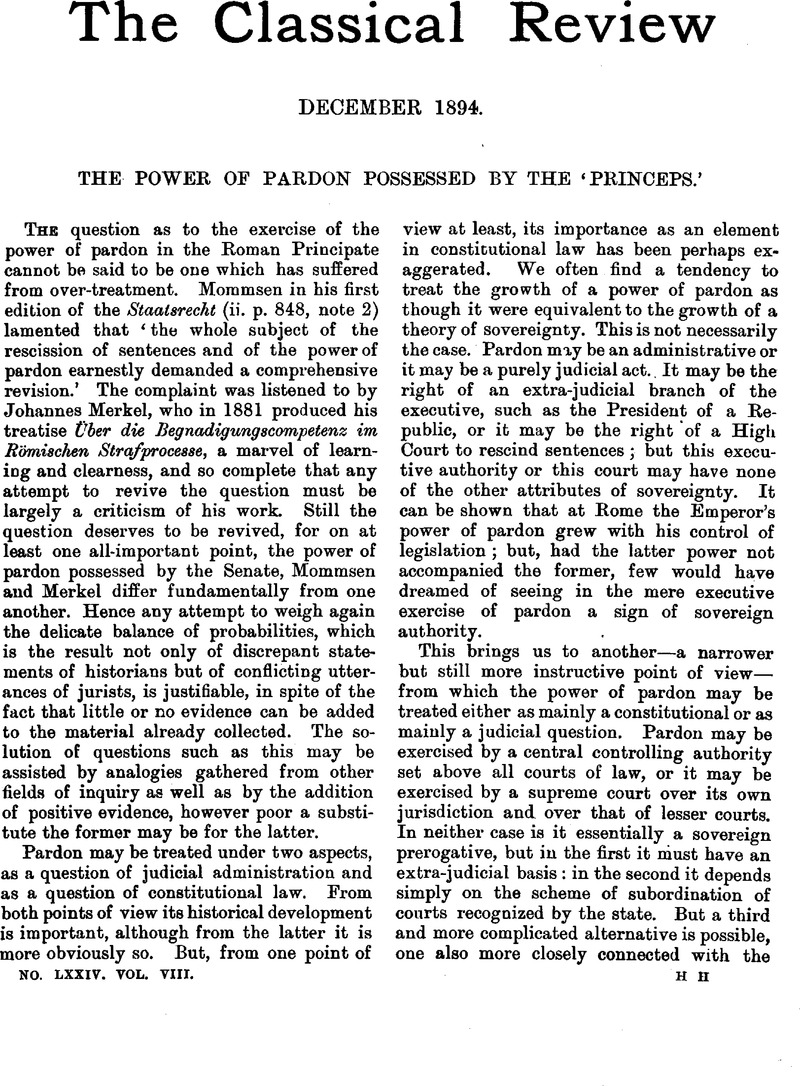No CrossRef data available.
Article contents
The Power of Pardon Possessed by the ‘Princeps.’
Published online by Cambridge University Press: 27 October 2009
Abstract

- Type
- Review Article
- Information
- Copyright
- Copyright © The Classical Association 1894
References
page 430 note 1 The earliest notice of the restriction appears to be found in the edict-commentary of Ulpian, written probably under Septimius Severus. It was Severus who created, or confirmed, the power of the ‘praefectus urbi’ to ‘deport’ (Dig. 48, 22, 6). This does not touch the question of the emperor's control over the ordinary criminal courts of Rome even for the time of Severus, since the ‘praefectus urbi’ was a delegate of the emperor.
page 431 note 1 In this case the delinquent had appeared in person, and the result was practically a trial in the ‘auditorium’ of the emperor. But this must have been very unusual. As a rule the procedure was by rescript, which did not demand the presence of the accused.
page 431 note 2 Tac. Ann. 3, 51, 3, ‘factum senatus consultum, ne decreta patrum ante diem decimum ad aerarium deferrentur idque vitae spatium damnatis prorogaretur’; cf. Dio lvii. 20, 4; Suet. Tib. 75. Merkel (op. cit. p. 54) notices a striking peculiarity of this rule from the point of view of constitutional law. The regulation that increases the power of the superior court is obtained by a concession of the lower.
page 432 note 1 Such specified cases are found in Trajan ad Plin. xxxii. and in a rescript of divus Pius (Dig. 48, 19, 22).
page 432 note 2 The words ‘quos Hadrianus damnaverat’ must probably be taken, with Merkel, to signify persons condemned in the emperor's courts. If they mean persons condemned by the senate (through the indirect influence of the emperor), the case is simple enough; since, as we shall see, the senate undoubtedly possessed the power of ‘restitutio’ within the sphere of its own jurisdiction.
page 432 note 3 This procedure of Claudius is cited by Suetonius amongst instances of his being ‘parcus atque civilis.’ The sentence immediately following the words cited from the life of Antoninus Pius begins ‘imperatorium fastigium ad summaru civilitatem deduxit.’
page 433 note 1 When Nero ‘Lolliae Paulinae cineres reportari sepulehrumque exstrui permisit’ (Tac. Ann. 14, 12, 6), this ‘restitutio memoriae’ was no doubt effected by a ‘senatus consultum.’ Lollia Paulina had been condemned by the senate.
page 434 note 1 In the passages referring to the reigns of Otho and Vitellius the language is indeterminate; the mention is simply of ‘reversi’ or ‘revocati ab exilio.’
page 434 note 2 A similar isolated case of ‘restitutio’ is mentioned by Pliny (Ep. 4, 9, 2), ‘(Julius Bassus) a Domitiano relegatus est: revocatus a Nerva.’
page 435 note 1 Ulpian in Dig. 49, 2, 1, 2, ‘sciendum est appellari a senatu non posse principem, idque oratioue divi Hadriani effectum.’ It becomes a stronger proof if we believe it to be an old principle confirmed (and not created) by Hadrian.
page 435 note 2 That he could not have possessed it from the first is proved by the necessity of employing the tribunician ‘intercessio’ as an indirect means of pardon.
page 435 note 3 Of the first kind were the leges Juliae de judicus ordinandis and judiciorum publicorum; of the latter such imperial regulations as that by which Titus put an end to an anomaly of the criminal courts by forbidding ‘de eadem re plurimis legibus agi’ (Suet. Tit. 8).
page 436 note 1 In the case of Piso Tiberius ‘minas accusantium et hinc preces audit integramque causam ad senatum remittit’ (Tac. Ann. 3, 10, 6). The word ‘remit’ is unfortunate, as it might seem to imply that the court to which the remit was made was bound to accept the case. This was not true either of the senate or of the ‘quaestiones,’ which were theoretically independent of any anterior decisions of the ‘princeps.’
page 437 note 1 The analogy is rendered imperfect by the probability that some of the members of the auditorium (e.g. great lawyers who were not distinguished for statesmanship) were not members of the consistory (Haubold de consistorio, p. 42).


